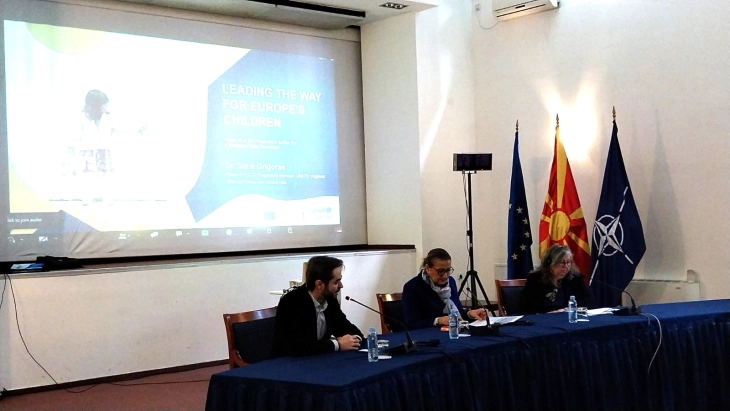North Macedonia to implement EU's Child Guarantee
- With the support of UNICEF, the Ministry of Labor and Social Policy will implement the European Child Guarantee scheme aimed at ensuring that most vulnerable children have access to healthcare, education, childcare, decent housing and adequate nutrition.

Skopje, 26 January 2024 (MIA) — With the support of UNICEF, the Ministry of Labor and Social Policy will implement the European Child Guarantee scheme aimed at ensuring that most vulnerable children have access to healthcare, education, childcare, decent housing and adequate nutrition.
At an event Friday held to launch the state's European Child Guarantee program, Minister of Labor and Social Policy Jovanka Trenchevska said it was a successful model already applied in EU member states to reduce child poverty.
In her remarks at the event, Minister Trenchevska said the government had recently adopted a national Human Capital Strategy to improve the lives of young people.
Also, she said, the Law on Child Protection had been amended; child care centers nationwide had gone through renovations and their staff had been retrained; new financial assistance packages had been introduced for school children in low-income families; and important reforms were implemented, including deinstitutionalization as a prerequisite for inclusion of children with disabilities.
All this, the labor minister said, demonstrated the government's commitment to strengthening children's rights and reducing child poverty.
Next, she said, the Ministry of Labor and Social Policy would implement the European Child Guarantee scheme with the help of UNICEF, with a view to providing all children with better access to education, social protection, and health care services.
The European Child Guarantee program would also help protect children victims of violence, she said, listing Slovenia, Croatia and Greece as examples of its successful implementation.
However, she said, many cases of violence against minors in the country went unreported, so she urged anyone who had witnessed child abuse to report it to social workers so they could help.
She also pointed out that the Ministry of Labor and Social Policy together with law enforcement authorities had taken recent actions to remove homeless youths from the streets.
"You can see that, in Skopje in particular, street children are gone from places they used to frequent," Trenchevska said.
"This is not something we can be done with in a week. Our commitment remains, so I believe that with the Children's Guarantee we will put an end to [the plight of] street children and exploiting children by sending them to beg on the streets."
Resident UNICEF Representative Patrizia DiGiovanni acknowledged the country's steps taken to address these issues and voiced her hope that the state would keep up its commitment to improving the lives of children.
The aim of the European Child Guarantee, she said, was for children to be able to reach their full potential.
"This is not only good for children, but also for families, communities and society," DiGiovanni said.
The European Child Guarantee is aimed at ensuring that every child in Europe at risk of poverty or social exclusion has access to the most basic of rights like healthcare and education.
Its objective is to prevent and combat social exclusion by guaranteeing effective access of children in need to a set of key services: free early childhood education and care; free education (including school-based activities and at least one healthy meal each school day); free healthcare; healthy nutrition; and adequate housing.
According to the EU, while most children in its member states already have access to these services, inclusive and truly universal access is vital for ensuring equal opportunities for all children, and in particular those who experience social exclusion due to poverty or other disadvantages. mr/







